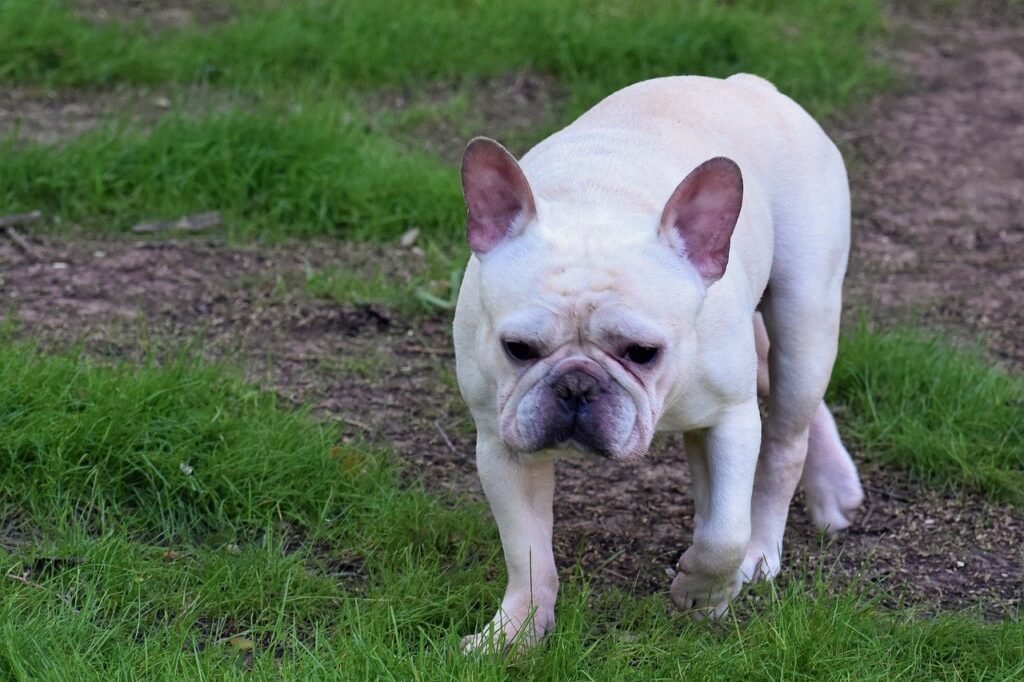What Age Can You Breed a French Bulldog? Guidelines for Breeding French Bulldogs, The Optimal Age for Health and Success
French Bulldogs are beloved for their charming personalities and distinctive appearance, making them a popular choice among dog lovers.
However, when it comes to breeding these adorable companions, it’s crucial to consider the right age for the male counterpart.
In this article, we’ll delve into the optimal age for breeding male French Bulldogs and important considerations for responsible breeding practices.

Understanding the French Bulldog Heat Cycle
The heat cycle of a French Bulldog closely mirrors that of other dog breeds, typically occurring twice a year and encompassing four distinct stages: proestrus, estrus, diestrus, and anestrus.
Proestrus
This initial stage lasts approximately 9-11 days. During proestrus, female French Bulldogs may display a swollen vulva and a discharge tinged with blood. Despite these physical changes, they are not yet receptive to mating.
Estrus
Spanning 9-11 days, estrus marks the phase when the female is receptive to mating. Ovulation typically occurs early in this stage, and the color of the discharge may transition from red to straw-colored, indicating increased fertility.
Diestrus
Following estrus, diestrus ensues, lasting roughly 60-90 days. If mating has occurred and the dog is pregnant, diestrus continues until the birth of the puppies. However, if conception hasn’t taken place, diestrus becomes a period of hormonal decline.
Anestrus
Anestrus is a resting stage in the heat cycle, characterized by dormancy in the dog’s reproductive tract and hormonal activity. This phase allows the body to recuperate and prepare for the next heat cycle, ensuring the health and vitality of the dog’s reproductive system.
Age Considerations for Breeding
Ideal Breeding Age Range
The ideal age for breeding a male French Bulldog typically falls between 12 to 18 months. This age range allows the dog to reach sexual maturity while ensuring that he’s physically and mentally prepared for the breeding process.
Health and Genetic Considerations
When considering breeding a male French Bulldog, it’s crucial to prioritize both health and genetic considerations to ensure the well-being of the parent dogs and their offspring. Health screenings play a vital role in identifying any underlying health conditions that could affect the breeding process or the health of the puppies.
These screenings typically include evaluations for hip dysplasia, patellar luxation, cardiac abnormalities, and genetic testing for hereditary diseases common in the breed. By conducting thorough health screenings before breeding, breeders can mitigate the risk of passing on genetic disorders to future generations.
Additionally, genetic testing helps identify any hereditary diseases or conditions that the male may carry, allowing breeders to make informed decisions about breeding pairs and reduce the risk of passing on genetic disorders.
Prioritizing health and genetic considerations in breeding practices is essential for producing healthy, well-adjusted puppies and maintaining the integrity of the French Bulldog breed.

Signs of Maturity in Male French Bulldogs
Physical Indicators
Physical indicators refer to observable characteristics or traits that signify maturity in male French Bulldogs. These signs include reaching their full adult size and weight, typically around 12 to 18 months of age.
As they mature, male French Bulldogs may develop broader shoulders and a more muscular build, indicative of their physical maturity.
Additionally, secondary sexual characteristics, such as changes in body shape or the development of reproductive organs, can also signal that the dog is reaching sexual maturity.
Observing these physical changes can help breeders determine if a male French Bulldog is ready for breeding, ensuring that he is physically capable of mating and producing healthy offspring.
Behavioral Indicators
Behavioral indicators refer to observable behaviors that signify maturity and readiness for breeding in male French Bulldogs. These behaviors serve as important cues for breeders to determine if a male dog is prepared for mating.
One significant behavioral indicator is the display of mating behaviors, such as increased interest in female dogs in heat and mounting behavior. Male French Bulldogs that are ready for breeding may exhibit heightened attention towards female dogs, often seeking out opportunities to mate.
Additionally, they may display territorial behavior and vocalizations to assert their dominance and attract potential mates. Moreover, mature male French Bulldogs are typically more confident and assertive in their interactions with other dogs, particularly females.
They may engage in courtship behaviors, such as sniffing and licking, as a means of communication and establishing rapport with potential mates. Observing these behavioral indicators can help breeders determine the optimal time for breeding and ensure successful mating outcomes.
By paying close attention to the behaviors displayed by male French Bulldogs, breeders can promote responsible breeding practices and contribute to the health and vitality of the breed.
Risks of Breeding Too Early
Breeding a male French Bulldog before he reaches physical and behavioral maturity can pose several risks.
Health Risks to the Male
Breeding too early can lead to reproductive problems and health complications in the male, including infertility, decreased sperm quality, and increased risk of injury during mating.
Risks to the Offspring
Breeding immature male dogs can result in litters with health issues and developmental problems, as they may not produce quality sperm necessary for healthy fertilization.
Ethical Considerations
Responsible breeding involves prioritizing the health and well-being of both the parent dogs and their offspring. Breeding too early can contribute to the overpopulation of French Bulldogs and perpetuate genetic disorders within the breed.
Preparing for Breeding
Before breeding a male French Bulldog, proper preparation is essential to ensure a successful and healthy mating process.
Health Screenings
Before breeding, the male should undergo thorough health screenings to detect any underlying health conditions that could affect the breeding process or the health of the offspring.
Genetic Testing
Genetic testing can help identify any hereditary diseases or conditions that the male may carry, allowing breeders to make informed decisions about breeding pairs and reduce the risk of passing on genetic disorders.
Environmental Considerations
Creating a safe and comfortable environment for breeding is essential for the well-being of both the male and female dogs. Providing a quiet, stress-free space for mating and whelping ensures a positive breeding experience.

Responsible Breeding Practices
Responsible breeding goes beyond simply producing puppies. It involves a commitment to breeding for health, temperament, and adherence to breed standards.
Importance of Ethical Breeding
Ethical breeding plays a crucial role in ensuring the health, well-being, and longevity of dog breeds like the French Bulldog. By adhering to ethical breeding practices, breeders uphold standards that prioritize the welfare of both parent dogs and their offspring.
One of the primary reasons ethical breeding is essential is to mitigate the prevalence of genetic disorders and hereditary diseases within the breed.
Responsible breeders conduct thorough health screenings and genetic testing to identify potential health issues in breeding pairs, thereby reducing the risk of passing on genetic disorders to future generations.
This commitment to health ensures that puppies are born with the best possible chance of leading healthy, fulfilling lives.
Furthermore, ethical breeding aims to preserve and improve the breed standard. By selectively breeding dogs that exhibit desirable traits such as good temperament, sound structure, and breed-specific characteristics, ethical breeders contribute to the overall betterment of the breed.
This helps maintain the unique qualities that make French Bulldogs beloved companions while minimizing the propagation of undesirable traits. Ethical breeding also promotes transparency and accountability within the breeding community.
Reputable breeders are committed to providing potential buyers with accurate information about their breeding practices, including health certifications, genetic testing results, and documentation of parentage.
This transparency fosters trust between breeders and buyers and empowers individuals to make informed decisions when choosing a puppy.
Breeding for Health and Temperament
Breeding for health and temperament is a cornerstone of responsible dog breeding, particularly for breeds like the French Bulldog. This approach prioritizes the physical and mental well-being of both parent dogs and their offspring, resulting in healthier, more well-adjusted puppies.
One of the primary goals of breeding for health is to reduce the incidence of genetic disorders and hereditary diseases within the breed. Responsible breeders conduct comprehensive health screenings and genetic testing on breeding dogs to identify and mitigate potential health concerns.
By selecting breeding pairs with favorable health outcomes, breeders can minimize the risk of passing on genetic disorders to future generations, ultimately improving the overall health of the breed.
In addition to physical health, breeding for temperament focuses on producing dogs with stable, predictable personalities and good behavioral traits. Ethical breeders prioritize selecting breeding pairs with sound temperaments, including traits such as friendliness, adaptability, and trainability.
By breeding dogs with favorable temperaments, breeders aim to produce puppies that are well-suited for various lifestyles and environments, making them excellent companions for families and individuals alike.
Finding a Reputable Breeder
When looking to breed a male French Bulldog, it’s essential to work with a reputable breeder who adheres to responsible breeding practices. A reputable breeder will prioritize the health and well-being of their dogs and be transparent about their breeding program.

Ethical Concerns of Breeding a French Bulldog
Health Risks to the Dogs: French Bulldogs face inherent health issues like breathing difficulties. Ethically, breeders should prioritize minimizing these problems to ensure the dogs’ well-being.
Breeding Practices: Ethical breeding practices prioritize the health and welfare of the parent dogs. Breeders must ensure that dogs are not overbred, as excessive breeding can lead to physical and emotional strain on the animals.
Informed Decisions: Breeders must possess a comprehensive understanding of the specific needs and challenges associated with French Bulldogs. This knowledge enables them to make informed decisions that prioritize the welfare of the dogs above all else.
Genetic Testing: Ethical breeders engage in genetic testing to identify and mitigate hereditary health issues within the breed. By screening breeding dogs for genetic disorders and diseases, breeders can avoid passing on potentially harmful traits to their offspring.
Medical Support and Care: Providing necessary medical support is essential for maintaining the health and well-being of French Bulldogs. Ethical breeders prioritize veterinary care, including routine check-ups, vaccinations, and emergency support when needed.
FAQs: French Bulldogs
At what age do male French Bulldogs reach sexual maturity?
Male French Bulldogs typically reach sexual maturity between 6 to 12 months of age, but it’s advisable to wait until they are at least 12 to 18 months old before breeding.
What health screenings should be performed before breeding a male French Bulldog?
Health screenings should include evaluations for hip dysplasia, patellar luxation, cardiac abnormalities, and genetic testing for hereditary diseases common in the breed.
Can breeding too early affect the long-term health of a male French Bulldog?
Yes, breeding too early can lead to reproductive problems, decreased sperm quality, and increased risk of injury during mating, potentially affecting the dog’s long-term health.
How can I ensure responsible breeding practices when breeding a male French Bulldog?
Work with a reputable breeder who prioritizes health, temperament, and adherence to breed standards. Conduct thorough health screenings and genetic testing, and provide proper care for both parent dogs and their offspring.
What are the risks of breeding an immature male French Bulldog?
Breeding an immature male can result in littering with health issues and developmental problems, as they may not produce quality sperm necessary for healthy fertilization.
Conclusion
Breeding a male French Bulldog requires careful consideration of age, health, and genetic factors to ensure the well-being of both the parent dogs and their offspring.
By waiting until the male reaches physical and behavioral maturity and prioritizing responsible breeding practices, breeders can help maintain the health and integrity of the French Bulldog breed for generations to come.





